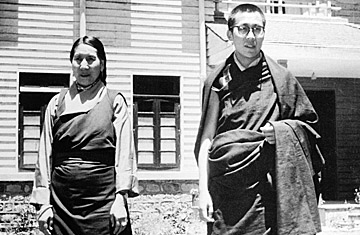
May 28, 1959: Tenzin Gyatso, the 14th Dalai Lama, and his mother, shortly after the Tibetan Buddhist ruler fled his homeland for exile in northern India
(8 of 9)
Unable to break the Dalai Lama's will, the Red commander decided on a show of strength. Last month, while Lhasa was still crowded with monks, pilgrims and peasants who had attended the New Year's Festival, the Red general sent a curt note ordering the Dalai Lama to appear, alone, at Communist headquarters.
Lhasa was appalled. It was unthinkable that a message should go directly to the Dalai Lama instead of being reverently submitted through his Cabinet. It was even worse to demand that the Living Buddha attend a meeting alone without his ceremonial train of senior abbots and court officials. On hearing the news, the Dalai Lama's mother burst into tears. Thousands of weeping women surged around the Indian consulate general and begged the consul to accompany them while they handed a protest petition to the Red Chinese. The monks of the city's three great lamaseries prepared to die before letting the Dalai Lama be taken from them. Hidden stores of arms were passed out to the furious populace. Khamba tribesmen with their rifles, swords and lean, savage dogs began to filter into Lhasa. The nervous Chinese set up machine-gun posts, trained artillery on the Potala and the Norbulingka palaces.
On March 17 the Dalai Lama, his mother, sister and two brothers, guarded by a fanatic escort, slipped out of Lhasa and moved north, where there were few Chinese patrols. Traveling only at night, the party carefully circled the city and headed south toward the Indian border. On March 19 the fighting started in
Lhasa, and only after three days, when the city's whitewashed houses, its palaces and lamaseries were a smoldering shambles, did the Red Chinese realize they had been outwitted, and set up the propaganda cry that the Dalai Lama had been kidnaped and was being held "by duress."
Asian Algeria. The smashing of the revolt in Lhasa was as brutal as the action of Soviet Russian tanks in Budapest. But Tibet is not another Hungary: it is more likely to become Red China's Algeria, a festering war to the knife that can be neither won nor lost. The Communist garrisons should be able to hold the cities and the main roads. They can even find a handful of Tibetan collaborators, like their tame puppet, the tenth Panchen Lama, a wan young man of 22 who is unable to control the monks of his own lamaseries. But the Red troops, estimated at 60,000-80,000, must be supplied from a base 70 miles distant, over a single, hazardous road that can be easily cut by Khamba guerrillas.
At week's end the Khamba rebels were reportedly joined by equally fierce Amdowa and Golok tribesmen, spreading the fires of revolt the length and breadth of Tibet, and putting into the field against the Chinese Reds an estimated 100,000 warriors, who were carrying the fight to the Chinese provinces of Szechwan and Tsinghai as well as Tibet proper. The Red radio protested plaintively that "reactionary elements" from China itself had joined the battle.
The rest of the world cheered the rebels and denounced their oppressors but made no other move. India, the biggest free neighbor, was giving shamefaced support to Premier Nehru's reiterated insistence that "India was anxious to have friendly relations with Red China."
When the Dalai Lama this week finally made his way through the jungles of
